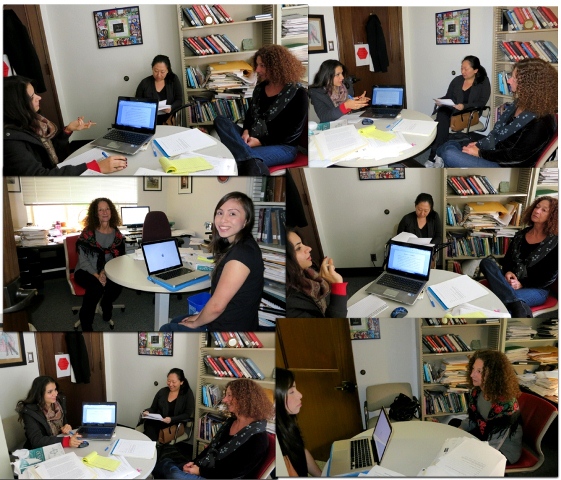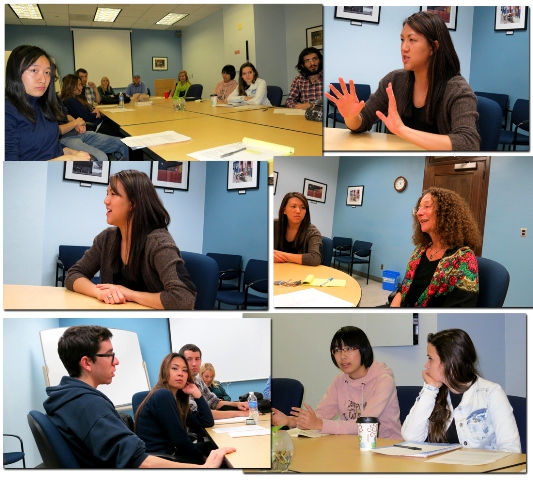Honors Program
Are you a sociology major who would like to study aspect of social life that is of interest to you in depth? Maybe you would like to examine the impact that punk rock has had on the political views of people who joined punk rock collectives, using in-depth interviewing. Or perhaps you are interested in conducting original research on Hong Kong’s socio-political and economic relations with China? Maybe you would like to analyze videotaped verbal interactions between children and adults in an experimental after-school program, or conduct an ethnographic study of a homeless clinic or domestic violence intervention program. Maybe you would like to examine the life trajectories and social networks of undocumented workers in a Los Angeles factory or explore beauty- and plastic surgery practices among Vietnamese-American women. These are all examples of research that UCLA students have conducted in the Departmental Honors Thesis Seminar. If you are interested in designing and carrying out your own research, the UCLA Sociology Departmental Honors Thesis Seminar is for you!
This four-quarter sequence provides a unique opportunity to use sociological concepts and methodology to answer your own questions about an aspect of social life that is of interest to you. While enrolled in the honors program, students often choose to take other classes that help them learn more about the topic they are researching. Their involvement in the honors program makes these other classes more meaningful and relevant. Honors students enjoy the benefits of priority enrollment, so they are able to get into the classes they chose more easily. In the Honors Seminar helps students learn to formulate interesting and relevant questions that are answerable using empirical research. They learn how to draw conclusions from their findings and fine-tune their arguments, skills that are essential for many professional occupations. The senior thesis itself serves as an impressive writing sample for those students applying to graduate or professional schools.
A printer-friendly handout and the department honors application are available here.
Applications due Thursday, February 9th.
Requirements:
- 3.5 GPA overall
- Soc20
- Soc101
- Soc102
- (prior to or concurrent with Honors)
The program begins in the Spring of third year with a regular seminar (Soc191H) that meets twice a week. In addition to readings and discussions about research-related issues, you will complete several hand-on exercises, including field observations and life-history interviews. This first quarter is also when you define your own project and match your research questions with appropriate research methods. In the following Fall, you would be enrolled in Soc198A and would collect data and read more of the relevant literature. (In some cases, when a student has already a defined research question and has begun data collection, they may be permitted to enter the program during the Fall quarter.) The Fall seminar only meets a few times as a group, but you will meet regularly with Professor Berend in one-on-one tutorials. You are expected to have completed your data collection by the beginning of the Winter Quarter, in order to leave ample time for organizing the data, reading, and writing (Soc198B). You would finish the Thesis in the Spring Quarter (Soc198C) and present your work at the Departmental Honors Thesis Conference. Every year, the Leo Kuper Prize is given to the best thesis.
You will receive help and guidance at each and every stage of the process from both Prof. Berend and also from a graduate student mentor, who will help with literature searches, methodology and writing. You will learn about how to compete for stipends for undergraduate research that range from $1000 to $5000. Each year, the program nominates interested and deserving students for the American Sociological Association (ASA) Honors section, which provides a wonderful opportunity to attend the largest sociological association in the country, hear talks, and participate in workshops with honors students across the country.
Course credit and letter grades are awarded on a quarter-by-quarter basis. If you complete the entire sequence of course work and submit an acceptable thesis, you will graduate with Departmental Honors and be recognized during culmination.
Past students rave about the program:
“The sociology honors program truly was one of my greatest UCLA experiences. It gave me the opportunity to not just be a consumer of knowledge, but actually ask and pursue my own questions. I was able to turn my interest in Zen Buddhism into a well-defined research project. My experience in the field conducting interviews and participating in a Zen Sangha as well as my exploration of the relevant literature, gave me an in depth perspective that I would have otherwise never attained. The one on one long-term attention you receive, creating and refining your unique research thesis, is an invaluable and extremely rare opportunity for an undergraduate. With Professor Berend I was challenged to become a better writer, thinker, and researcher. All of the academic skills and intellectual growth I gained during the honors program has helped me in my current work with at-risk youth at Orange County Dept. of Ed.’s Title One program.”
“The Honors program was the most challenging and rewarding experience as an undergrad at UCLA! It allowed me to do research in a subject that was dear to my heart, and appreciate the hard work of researchers. The skills that I learned during the Honors Program continue to help me now that I am pursuing a Masters in School Counseling. As future professionals we will always be doing or learning from research.”
“Though I didn’t quite know what to expect when I joined the Honors program, the knowledge I gained during that time has served as a foundation for my academic career. I learned then what it means to do good ethnography, capturing the feel of a place and the people that inhabit it. I also learned how to talk to people about their lives through in-depth interviewing. Some of my most poignant learning experiences at UCLA were during my Honors year, such as conducting observations at the Westwood farmer’s market, and doing a life-history interview. But the Honors program did more than teach me methods: it fostered a rich intellectual community that enabled me to discover my passion for research. I am in the process of completing my dissertation at the University of Michigan, Ann Arbor, examining psychotherapeutic expertise with the ethnographic sensibility I acquired during my time as an Honors student.”
“The Honors Program in Sociology at UCLA provided me with my first opportunity to do truly original research. This in and of itself was eye opening. I actually had the chance to pick a topic of interest and spend over a year developing a novel piece of scholarship. Now, after practicing law for several years, I find myself back in an academic environment – this time working on a PhD. I’m constantly using the toolkit I developed in the Honors Program in Sociology in my current program. With a small cohort and the dedicated attention from Prof. Berend, I was able to learn qualitative method research techniques and I was given constant feedback during the entire process. I have to say that without this experience I probably would not be on the path I am on today.”
“In such a large, public university, it can be difficult to receive the faculty and staff support you want. The honors program helped me by providing the personal support structure I needed to write a senior thesis. My own thesis was qualitative, and even though I am currently doing quantitative work, having done a highly qualitative study gave me the experience to appreciate a mixed methods approach to conducting sociological inquiry. Upon completing the honors program at UCLA, I applied to graduate schools and am now a first-year graduate student at the University of Washington in Seattle.”
“If you are considering graduate school in sociology (or in the related social sciences), participating in the honors program is essential. The rigorous process of doing background work, devising a research project, carrying it out and then analyzing the data was certainly challenging, but it reaffirmed my passion for sociology and desire to continue to graduate school. Professor Berend offers crucial guidance throughout the process and is very committed to being there when you need her, but the program is ultimately about conducting independent research. In the end, you will certainly feel accomplished and glad you participated.”
“Professor Berend’s honors seminar provided the ideal space for me to write my honors thesis. Writing an honors thesis was a very challenging albeit rewarding experience for me. The seminar provided a supportive and academically stimulating environment where I was able to receive invaluable written and verbal feedback on the development of my project. As a result, the seminar enabled me to strengthen and refine my oral and written analytical skills; skills, which are applicable to graduates pursuing any line of work or future graduate study.”
“The departmental honors program presented me a rare opportunity to pursue a research project that was truly interesting to me as an undergraduate. It provided me the necessary training and guidance to develop my own original ideas and eventually write an award winning honors thesis. Most importantly, this program gave me a solid foundation in empirical research which has helped me further my academic career as an aspiring sociologist now in graduate school. For anyone interested in pursuing Sociology as a discipline, this program is a great way to start.”
“I can say this this program and Prof. Berend leading it were what helped shape me into the sociologist that I am today.”
To find out more, contact Professor Berend at berend@soc.ucla.edu




